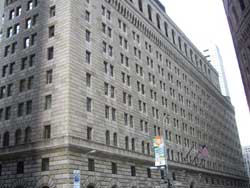|
The state of the US economy has worsened noticeably in the past six weeks, said the US Federal Reserve in its Beige Book report that monitors economic activity in 12 of the country's largest business districts (Boston, New York, Philadelphia, Cleveland, Richmond, Atlanta, Chicago, St. Louis, Minneapolis, Kansas City, Dallas and San Francisco). The report, commonly known as the Beige Book, is published eight times a year. Each report is based on district-wise anecdotal information on current economic conditions gathered through reports from local Federal Reserve unit directors and interviews with key business contacts, economists, market experts, and other sources outside the Federal Reserve and is not commentary on the views of Federal Reserve officials.  The Beige Book summarises this information by district and sector. An overall summary of the 12 district reports is prepared by a designated district Federal Reserve Bank on a rotating basis. The Beige Book summarises this information by district and sector. An overall summary of the 12 district reports is prepared by a designated district Federal Reserve Bank on a rotating basis.
The current report has been prepared at the Federal Reserve Bank of New York and based on information collected on or before April 7, 2008. It says economic conditions have weakened since the last report with the pace of economic activity slowing in in nine districts, while the remaining three--Boston, Cleveland, and Richmond--described activity as mixed or steady. Consumer spending weakened in most, but not all, districts with retail inventories generally reported to be steady or rising. Despite the general weakness in consumer spending, tourism was generally described as robust, with that strength, in a number of instances, attributed to international visitors. Manufacturing
Manufacturing activity was varied, with some districts reporting a slight increase in activity, some indicating weaker activity, and several noting that activity was mixed or had held steady. Demand was reported as strong for aerospace, aircraft, and defence goods, as well as for steel and food. Real Estate and Construction
Housing markets and home construction remained sluggish throughout most of the nation, though there were few signs of any quickening in the pace of deterioration. Ongoing weakness in housing markets, in general, was reported in almost all districts. Banking and Finance
Banks reported mixed trends in lending activity, with fairly widespread slowing in the consumer segment but some stabilisation, at low levels, in residential mortgage activity. Agriculture and Natural Resources
Agricultural reports were generally upbeat, with most respondents citing improved growing conditions and favourable pricing. Prices
All Districts continued to report increases in input costs and output prices. In particular, price increases were consistently reported for food products, fuel and energy products, and many raw materials. More specifically, increases in the price of chemicals, metals, plastics and other petroleum-based products were commonly cited. Most manufacturers have or are planning to increase prices in response to rising input costs, while the response of service firms has been more mixed, in part due to differences in competitive pressures. On balance, input costs have risen more rapidly than output prices, putting pressure on margins for many firms. Most districts reported little change in retail price inflation.
|